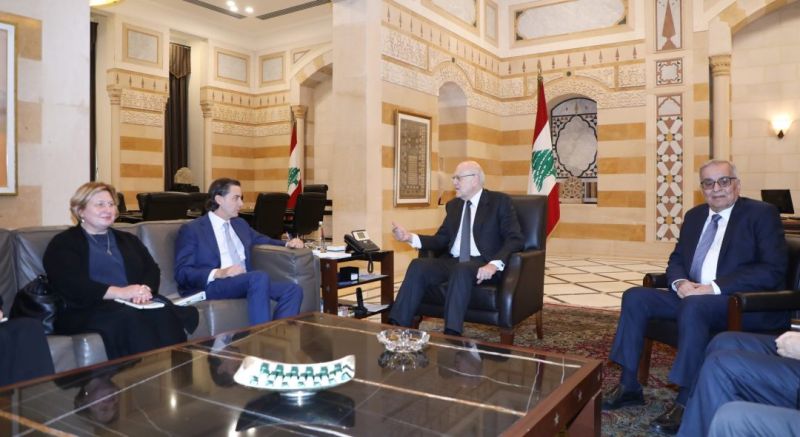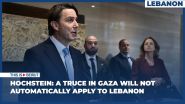- Home
- War in the Middle East
- Hochstein Leaves Lebanon Following Inconclusive Talks

Amos Hochstein, US President Joe Biden's Special Advisor on Energy Affairs, left Lebanon Thursday evening, following inconclusive talks with Lebanese officials on de-escalating confrontations between Hezbollah and Israel in south Lebanon.
According to information received by This is Beirut, Hochstein’s proposals for easing tensions in southern Lebanon were not well-received, the reason behind his speedy departure.
Hochstein was apparently unhappy with the outcome of his mission following meetings with caretaker Prime Minster Najb Mikati and Parliament Speaker Nabih Berri, as per the information.
Initial reports suggested that the aim of the US envoy's visit was limited to easing tension in southern Lebanon, whereas hopes had been pinned on strict implementation of UN Security Council Resolution 1701.
Hochstein, who arrived in Beirut on Thursday, stressed the need to work towards "easing tensions in South Lebanon," as clashes on this front, opened by Hezbollah in support of Hamas in its war in Gaza against Israel, entered their fourth month.
In his second visit to Lebanon since the start of the war in Gaza on October 7, Hochstein reiterated to his Lebanese interlocutors his call for calm, "even if, at present, it is impossible to reach a definitive solution." In this context, he called on the Lebanese parties to work towards "a temporary mediation solution, to prevent the situation from deteriorating."
This implies a postponement of the strict application of resolution 1701, though international bodies and the majority of local factions have been calling for months for a return to the application of the UN resolution, which provides for a withdrawal of the Hezbollah militia to the north of the Litani River, and cessation of Israel violations of Lebanese air space and territorial waters.
The US envoy started his tour in Beirut by meeting with caretaker Prime Minister Najib Mikati, who emphasized "that the priority should be given to stopping military operations in Gaza, halting Israeli attacks on Lebanon, and the repeated violations of Lebanese sovereignty." He reiterated, "We want peace and stability through commitment to international resolutions."
Hochstein said that he was "satisfied" with the talks he held with Lebanese officials to reach "a diplomatic solution" to the clashes in South Lebanon.
"I'm sure that the Lebanese people don't want the situation to deteriorate," he said after his meeting with Berri in Ain el-Tineh. "We want a diplomatic solution that allows the Lebanese to return to their homes in South Lebanon, and the Israelis to theirs on the country's northern border."
Hochstein pointed out that "the Israeli government has given assurances that it favors a diplomatic solution and I am confident that this is what both parties in Lebanon and Israel want."
Hochstein also met with the army’s Commander-in-Chief, General Joseph Aoun.

According to information received by This is Beirut, Hochstein’s proposals for easing tensions in southern Lebanon were not well-received, the reason behind his speedy departure.
Hochstein was apparently unhappy with the outcome of his mission following meetings with caretaker Prime Minster Najb Mikati and Parliament Speaker Nabih Berri, as per the information.
Initial reports suggested that the aim of the US envoy's visit was limited to easing tension in southern Lebanon, whereas hopes had been pinned on strict implementation of UN Security Council Resolution 1701.
Hochstein, who arrived in Beirut on Thursday, stressed the need to work towards "easing tensions in South Lebanon," as clashes on this front, opened by Hezbollah in support of Hamas in its war in Gaza against Israel, entered their fourth month.
In his second visit to Lebanon since the start of the war in Gaza on October 7, Hochstein reiterated to his Lebanese interlocutors his call for calm, "even if, at present, it is impossible to reach a definitive solution." In this context, he called on the Lebanese parties to work towards "a temporary mediation solution, to prevent the situation from deteriorating."
This implies a postponement of the strict application of resolution 1701, though international bodies and the majority of local factions have been calling for months for a return to the application of the UN resolution, which provides for a withdrawal of the Hezbollah militia to the north of the Litani River, and cessation of Israel violations of Lebanese air space and territorial waters.
The US envoy started his tour in Beirut by meeting with caretaker Prime Minister Najib Mikati, who emphasized "that the priority should be given to stopping military operations in Gaza, halting Israeli attacks on Lebanon, and the repeated violations of Lebanese sovereignty." He reiterated, "We want peace and stability through commitment to international resolutions."
Hochstein said that he was "satisfied" with the talks he held with Lebanese officials to reach "a diplomatic solution" to the clashes in South Lebanon.
"I'm sure that the Lebanese people don't want the situation to deteriorate," he said after his meeting with Berri in Ain el-Tineh. "We want a diplomatic solution that allows the Lebanese to return to their homes in South Lebanon, and the Israelis to theirs on the country's northern border."
Hochstein pointed out that "the Israeli government has given assurances that it favors a diplomatic solution and I am confident that this is what both parties in Lebanon and Israel want."
Hochstein also met with the army’s Commander-in-Chief, General Joseph Aoun.

Read more



Comments